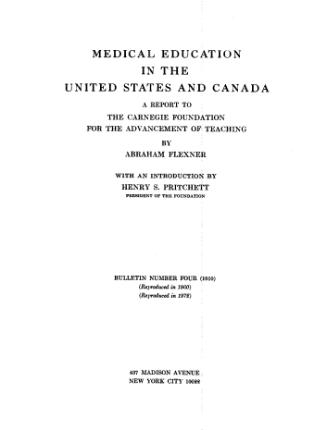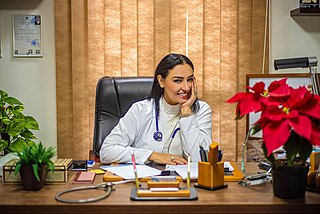Related Research Articles
Osteopathic medicine is a branch of the medical profession in the United States that promotes the practice of science-based medicine, often referred to in this context as allopathic medicine, with a set of philosophy and principles set by its earlier form, osteopathy. Osteopathic physicians (DOs) are graduates of American osteopathic medical colleges and are licensed to practice the full scope of medicine and surgery in all 50 US states. The field is distinct from osteopathic practices offered in nations outside of the U.S., whose practitioners are generally not considered part of core medical staff nor of medicine itself, but rather are alternative medicine practitioners. The other major branch of medicine in the United States is referred to by practitioners of osteopathic medicine as allopathic medicine.

Louis Wade Sullivan is an active health policy leader, minority health advocate, author, physician, and educator. He served as the Secretary of the United States Department of Health and Human Services during President George H. W. Bush's Administration and was Founding Dean of the Morehouse School of Medicine.

New York Medical College is a private medical school in Valhalla, New York. Founded in 1860, it is a member of the Touro University System.

The Flexner Report is a book-length landmark report of medical education in the United States and Canada, written by Abraham Flexner and published in 1910 under the aegis of the Carnegie Foundation. Flexner not only described the state of medical education in North America, but he also gave detailed descriptions of the medical schools that were operating at the time. He provided both criticisms and recommendations for improvements of medical education in the United States.

SUNY Downstate Health Sciences University is a public medical school and hospital in Brooklyn, New York. It is the southernmost member of the State University of New York (SUNY) system and the only academic medical center for health education, research, and patient care serving Brooklyn's 2.5 million residents. As of Fall 2018, it had a total student body of 1,846 and approximately 8,000 faculty and staff.
Doctor of Osteopathic Medicine is a medical degree conferred by the 38 osteopathic medical schools in the United States. DO and Doctor of Medicine (MD) degrees are equivalent: a DO graduate may become licensed as a physician or surgeon and thus have full medical and surgical practicing rights in all 50 US states. As of 2021, there were 168,701 osteopathic physicians and medical students in DO programs across the United States. Osteopathic medicine emerged historically from osteopathy, but has become a distinct profession.

The presence of women in medicine, particularly in the practicing fields of surgery and as physicians, has been traced to the earliest of history. Women have historically had lower participation levels in medical fields compared to men with occupancy rates varying by race, socioeconomic status, and geography.

Harold Amos was an American microbiologist. He taught at Harvard Medical School for nearly fifty years and was the first African American department chair of the school.
The MacLean Center for Clinical Medical Ethics, founded in 1981, is a non-profit clinical medical ethics research institute based in the United States. Founded by its director, Mark Siegler, the MacLean Center for Clinical Medical Ethics aims to improve patient care and outcomes by promoting research in clinical medical ethics by educating physicians, nurses, and other health care professionals and by helping University of Chicago Medicine patients, families, and health care providers identify and resolve ethical dilemmas. The center has trained over 410 fellows, including many physicians, attorneys, PhDs and bioethicists.

Franklin Chambers McLean was a Professor and Chairman of the Department of Medicine and the first appointed Director of the University of Chicago Medical Clinics, as well as the founder of the National Medical Fellowships. He aided the Manhattan Project by studying effects of radiation on organisms. He was also a trustee of the Julius Rosenwald Fund and Fisk University.

Virginia Margaret Alexander was an American physician, public health researcher, and the founder of the Aspiranto Health Home in Philadelphia, Pennsylvania.

Anna Cherrie Epps was an American microbiologist known for her immunology research as well as her efforts to promote the advancement of minorities within the sciences, specifically medicine.

The City University of New York (CUNY) School of Medicine is a public medical school that was established on June 10, 2015, and began operation in the fall of 2016. The school is in Hamilton Heights on the campus of The City College of New York (CCNY) and partners with Saint Barnabas Health System in the South Bronx, Harlem Hospital Center of NYC Health + Hospitals Corporation, and Staten Island University Hospital of Northwell Health for clinical medical education.

Edith Irby Jones was an American physician who was the first African American to be accepted as a non-segregated student at the University of Arkansas for Medical Sciences and the first black student to attend racially mixed classes in the American South. She was the first African American to graduate from a southern medical school, first black intern in the state of Arkansas, and later first black intern at Baylor College of Medicine.
Dr. Velma Scantlebury GCM also Velma Scantlebury-White is a Barbadian-born American transplant surgeon. She was the first Black woman transplant surgeon in the United States. She has received many honors in her career, having been named to both the "Best Doctors in America" and "Top Doctors in America" lists multiple times.
Joan Y. Reede is an American physician. She is Harvard Medical School's inaugural dean for diversity and community partnership in the Office of Diversity, Inclusion, and Community Partnership. She is also a member of the National Academy of Medicine. She is known for creating programs that mentor and support minority physicians and female physicians. Alumni of her programs have created a 501(c)(3) organization called The Reede Scholars in her honor.
Barbara Ross-Lee, D.O. is an American physician, academic, and the first African-American woman to serve as dean of a U.S. medical school; she is also known as the sister of Diana Ross along with being the aunt of actress Tracee Ellis Ross, and singer-songwriters Rhonda Ross Kendrick and Evan Ross. She majored in biology and chemistry at Wayne State University, graduating in 1965. Then, in 1969, she entered Michigan State University's College of Osteopathic Medicine. Ross-Lee then went on to open her own private family practice, teach as a professor, and hold other positions within the medical community. In 1993, she was elected as the first woman dean of a medical school, at Ohio University's Heritage College of Osteopathic Medicine. She has earned several awards and honors for her work and accomplishments.
Yvonnecris Smith Veal is an American physician known for her leadership and advocacy for African-American women physicians. She was the first woman leader of the National Medical Association Board of Trustees and one of the first African-American students at the Medical College of Virginia.
Richard Allen Williams is an American physician who is founder of the Association of Black Cardiologists. He previously served as the President of the National Medical Association.

Concerns of both a current and future shortage of medical doctors due to the supply and demand for physicians in the United States have come from multiple entities including professional bodies such as the American Medical Association (AMA). The subject has been analyzed as well by the American news media in publications such as Forbes, The Nation, and Newsweek. In the 2010s, a study released by the Association of American Medical Colleges (AAMC) titled The Complexities of Physician Supply and Demand: Projections From 2019 to 2034 specifically projected a shortage of between 37,800 and 124,000 individuals within the following two decades, approximately.